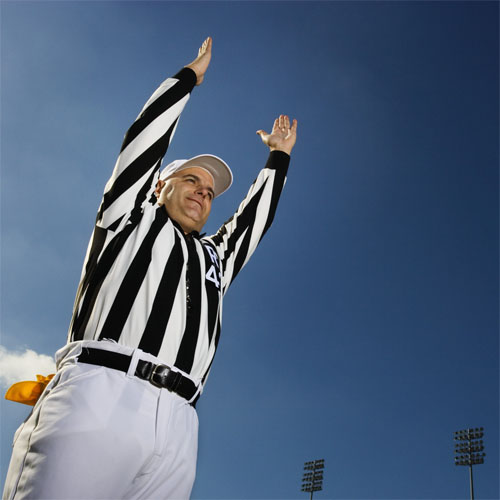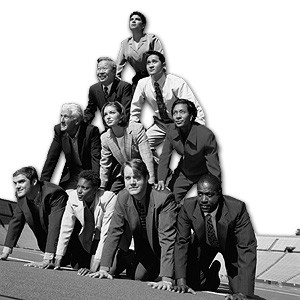
Zebra
Somewhere in, NJ
Male, 62
I've officiated football for over 30 years, now in my 26th on the college level. I've worked NCAA playoffs at the Division II and III level. In addition, I've coached at the scholastic level and have been an educator for over 35 years. I have no interest whatsoever in being an NFL official! Ever!
You'd think that, wouldn't you? What happened here, though, is the "line to gain" had not been set; the chains weren't set yet. So under that circumstance (Rule 5-2-7) the penalty is enforced and then the chains are set. It reads: The penalty for any dead ball foul....that occurs after a series ends [they made the line to gain] and before the ball is ready for play shall be completed before the line to gain is established.
1st and 10 from the 16,
That's a TD for B. A2 gets disqualified for the swing - contact isn't necessary. Enforce penalty on the try.
More and more people are more and more concerned about injuries in fooball. The recent rule changes - at all levels - reflects that. The kickoff is the ultimate collision. Line up 11 guys on each side and give them a running start at each other. Yes, the flying wedge was incredibly dangerous and recent changes on kickoffs - even preventing players from holding hands in a line - are intended to prevent injury.
Everybody grabs the opponent's jersey. It's what you do after that that makes a difference. If you pull the player down with a handful of jersey, or you grab and turn the player, you're holding. Grabbing a jersey and driving the man straight ahead? No issue. Two men doing grabbing? Philosophically the offense has committed two players to block one -- who is really at a disadvantage?
CBP Officer
 How cooperative are Mexican authorities re: US immigration and border control?
How cooperative are Mexican authorities re: US immigration and border control?
HR Executive
 How do you feel about employees working remotely?
How do you feel about employees working remotely?
TV Meteorologist
 What were your worst on-screen bloopers?
What were your worst on-screen bloopers?
Yes. Within limits. He cannot be moving forward at the time of the snap. Everyone must have come to a complete stop before he starts to move sideways. But, the basic answer is, yes.
There are several scenarios to what you ask. If a ball carrier's helmet comes off, the play is dead immediately. That's a safety issue. If anyone else's helmet comes off, they have an opportunity to step away and not participate; the play goes on. If a player's helmet comes off and he is already engaged (making a play on the runner, in process of making a block) he may continue. If a player's helmet comes off, he may not continue to play (beyond a step or two) or it is a personal foul.
Odd question. Most of our equipment is simply clothing. Good shoes help. But the most important thing you take onto the field is your brain.
-OR-
 Login with Facebook
Login with Facebook (max 20 characters - letters, numbers, and underscores only. Note that your username is private, and you have the option to choose an alias when asking questions or hosting a Q&A.)
(A valid e-mail address is required. Your e-mail will not be shared with anyone.)
(min 5 characters)
By checking this box, you acknowledge that you have read and agree to Jobstr.com’s Terms and Privacy Policy.
-OR-
 Register with Facebook
Register with Facebook(Don't worry: you'll be able to choose an alias when asking questions or hosting a Q&A.)